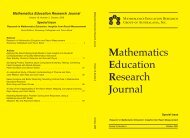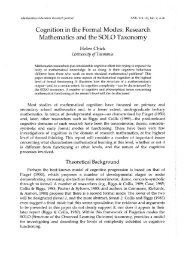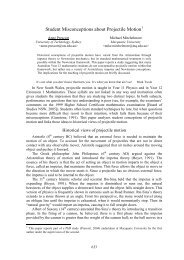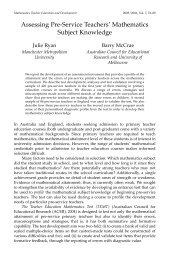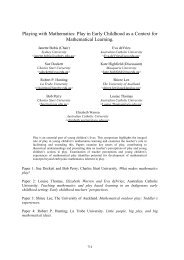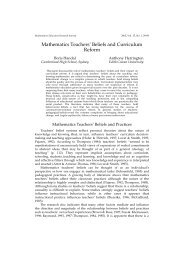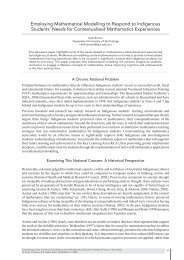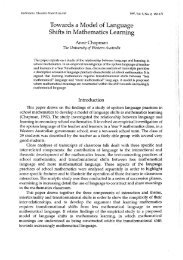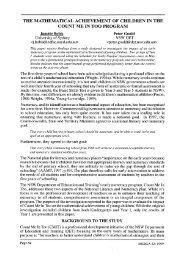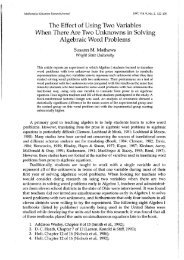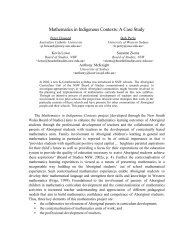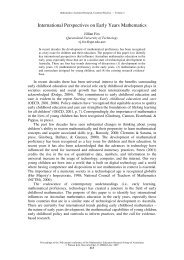Sabre Rattling or Genuine Change - merga
Sabre Rattling or Genuine Change - merga
Sabre Rattling or Genuine Change - merga
Create successful ePaper yourself
Turn your PDF publications into a flip-book with our unique Google optimized e-Paper software.
Mathematics Teacher Education and Development<br />
Edit<strong>or</strong>ial<br />
<strong>Sabre</strong> <strong>Rattling</strong> <strong>or</strong> <strong>Genuine</strong> <strong>Change</strong><br />
Mary Klein, Ian Putt and Gl<strong>or</strong>ia Stillman<br />
1999, Vol. I, 1-3<br />
In the hist<strong>or</strong>y of mathematics education in Australia there have been two<br />
<strong>or</strong>ganisations which, over the years, have involved many mathematics educat<strong>or</strong>s<br />
from the tertiary sect<strong>or</strong>. The Mathematics Education Research Group of Australasia<br />
[MERGA] which began in 1977 was representative of people from all over the<br />
country and, m<strong>or</strong>e recently, the south west Pacific and south east Asian regions. On<br />
the other hand the Mathematics Education Lecturers' Association [MELA] began as<br />
an <strong>or</strong>ganisation of lecturers in teachers' colleges in New South Wales in 1973 and<br />
then gradually expanded to include people from other states. The decision was<br />
made to amalgamate the two <strong>or</strong>ganisations in 1997. In <strong>or</strong>der to maintain an avenue<br />
f<strong>or</strong> the dissemination of innovative practices in mathematics education and<br />
discussion of issues which affected lecturers and their roles this publication <br />
Mathematics Teacher Education and Development [MTED] - was proposed and has now<br />
become a reality with this first issue.<br />
A decade ago Ellerton and Clements (1989) conducted an hist<strong>or</strong>ical analysis of<br />
mathematics teaching and teacher education in Australia, and lamented the<br />
pervasiveness and tenacity of "the persistent stereotypical image of school<br />
mathematics as something that needs to be drilled into children" (p. 13). They<br />
advocated "constructivist" approaches to teaching in schools and Universities as a<br />
way of moving f<strong>or</strong>ward. This was reinf<strong>or</strong>ced in the rep<strong>or</strong>t titled Discipline Review<br />
of Teacher Education in Mathematics and Science (Speedy, 1989). Learning and<br />
change were seen to be dependent on collab<strong>or</strong>ative social engagements where<br />
learners solved problems together and investigated and communicated their<br />
findings on challenging issues. Thus, the new knowledge could m<strong>or</strong>e readily be<br />
seen to be "owned", and m<strong>or</strong>e readily applied in context, by the individual who had<br />
(re)constructed it.<br />
As we embrace the year 2000, it may be a salutary experience to ponder where<br />
the future might take us in mathematics teacher education and research. Three<br />
articles which rep<strong>or</strong>t on attempts at ref<strong>or</strong>m in teacher education are those by<br />
Merrilyn Goos, Sandy Schuck, and Shelley Dole, Steven Nisbet, Elizabeth Warren<br />
and Tom Cooper. Each of 'these articles focuses on learning communities, stressing<br />
the social and cultural aspects of knowledge growth.<br />
Merrilyn Goos adopts a sociocultural perspective on learning as a the<strong>or</strong>etical<br />
rationale f<strong>or</strong> classroom ref<strong>or</strong>m and ref<strong>or</strong>m in teacher education. Merrilyn examines<br />
how the zone of proximal development can be used to enhance learning in a<br />
secondary classroom community and in a teacher education program where a<br />
ment<strong>or</strong> scaffolds a preservice student's post lesson reflections.<br />
Sandy Schuck argues that a learning community can be a powerful agent in<br />
helping students reflect on their own beliefs, and that computer-mediated
2 Klein, Putt & Stillman<br />
conferencing tools can be usefully employed in an electronic learning community.<br />
Shelley Dole, Steven Nisbet, Elizabeth Warren and Tom Cooper also set up a<br />
community of inquiry where they w<strong>or</strong>ked with primary teachers on a professional<br />
development program to improve assessment and teaching practices.<br />
The meta-the<strong>or</strong>etical framing of each of these studies is that teachers and<br />
preservice teachers, seeing and knowing mathematics teaching and learning<br />
differently through their involvements in intellectual debate and discussion in<br />
learning communities, will also (re)construct their teaching practice to reflect greater<br />
learner participation and collab<strong>or</strong>ation.<br />
Mary Klein regards the learning community, and the interactions and<br />
participants within it, as problematic. She questions the adequacy of contemp<strong>or</strong>ary<br />
notions of teacher agency which are framed within humanistic understandings of<br />
the individual as freely able to act competently and autonomously. She also suggests<br />
that teacher education programs may actually position the students as almosttotally<br />
reliant on help and approval from the lecturer and classroom superviser. Margaret<br />
Walshaw, too, directly challenges the assumptions and practices of contemp<strong>or</strong>ary<br />
teacher education. She suggests that what we have come to know as teaching is now<br />
seriously undermined by social the<strong>or</strong>ies of the postmodern.<br />
Though much has been achieved in preservice teacher education and<br />
professional development programs, though many issues have been researched and<br />
papers written, there is still much to be done. A-s Fred Biddulph makes clear in his<br />
,paper many preservice teachers themselves leave school with very po<strong>or</strong><br />
understanding of relatively simple mathematics. Furtherm<strong>or</strong>e, they have deeply<br />
negative feelings and attitudes towards the subject of mathematics which are quite<br />
debilitating f<strong>or</strong> potential .teachers. Robyn Zevenbergen, in her practical paper<br />
attempts to redress both problems when she describes how preservice teachers<br />
engage in the construction and assessment of posters which visually represent<br />
mathematical concepts. In this instance, preservice teachers need to know the<br />
mathematics, and they need to know at least one way of representing what they<br />
know to others.<br />
Julia H<strong>or</strong>ring, Judy Paterson aild Bill Barton address an issue that is highly<br />
relevant f<strong>or</strong> most mathematics educat<strong>or</strong>s, namely, the determination of "future<br />
effectiveness" of preservice teachers when they are undertaking practice teaching<br />
experiences in schools. They address students' subject matter knowledge and their<br />
pedagogical knowledge in the context of being observed by lecturers using a<br />
classroom observation schedule and a holistic impression <strong>or</strong> 'gut feeling' f<strong>or</strong> a small<br />
number of lessons. Their paper raises the question of whether <strong>or</strong> not the notion of<br />
'effectiveness' will be manifested similarly in all school contexts in a variety of<br />
cultures and socio-cultural groups.<br />
As founding edit<strong>or</strong>s it has been an exciting and challenging task to solicit<br />
articles from colleagues in Australasia and to piece together this first issue of the<br />
journal. We have appreciated the critical comments of many colleagues within the<br />
academic community who have acted as referees at sh<strong>or</strong>t notice and the way that<br />
people have produced papers under extremely difficult time pressures.
Edit<strong>or</strong>ial<br />
References<br />
Speedy, G. (1989). Discipline review of teacher education in mathematics and science. Canberra,<br />
ACT: Australian Government Publishing Service.<br />
Ellerton, N., & Clements, M. A. (1989). Changing the image of primary mathematics teacher<br />
education in Australia. In Mathematics educat<strong>or</strong>s in Australia: Imitat<strong>or</strong>s <strong>or</strong> initiat<strong>or</strong>s?<br />
(Proceedings of the 8th biennial conference of the Mathematics Education Lecturers<br />
Association pp. 12-29). Bathurst, NSW: MELA.<br />
3



